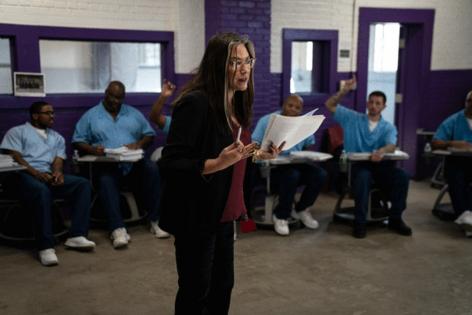'Transformative': More college programs are slowly coming into prisons
Published in News & Features
When the U.S. Department of Education announced last summer that federal Pell Grants would become available to incarcerated college students, lawmakers and state corrections agencies scrambled to adjust statutes and step up potential partnerships with universities.
But nearly a year later, colleges and agencies are recognizing the steep administrative challenge to winning approval from the U.S. Department of Education. So far, just one new program eligible for the federal financial aid grant — in California — has gotten off the ground.
“We’re going to see an impact — it’s coming. It’s been a bit slow to arrive because of this quality focus within the regulations,” said Ruth Delaney, who leads a program at the Vera Institute of Justice to help scale up college programs in correctional institutions. “What’s great is that there’s a lot of energy in colleges and corrections to start new prison education programs.”
Pell Grants were officially restored for incarcerated students in July 2023, following a nearly 30-year federal ban that prohibited most incarcerated students from receiving the aid. The ban was one of the provisions in the sweeping 1994 federal crime bill signed by President Bill Clinton.
More than 750,000 incarcerated students could potentially become eligible for Pell Grants. But to qualify, they must be below the family income limits and be at a prison that offers a college program approved by the federal Department of Education.
To date, only one program has been fully approved, at Pelican Bay State Prison in northern California. Students there will be eligible to receive Pell Grants starting next fall to study for a degree in communications from California State Polytechnic University, Humboldt.
Still, officials from state corrections agencies in Maryland, Michigan and Wisconsin told Stateline that since Pell dollars became available, more colleges and universities have become interested in establishing prison education programs. Since last summer, 44 state corrections agencies and the federal Bureau of Prisons have developed applications or other systems to approve prison education programs, according to the Vera Institute of Justice.
“There are people in prison who have been waiting 30 years for this opportunity to come back, and they are just so eager to enroll,” Delaney said in an interview. “Anything we can do to move quickly to get high-quality programs in place — that’s what we’d like to see.”
State action
The Pell Grant, awarded by the U.S. Department of Education, is provided to low-income students across the country to help cover college expenses. Most students apply online using the Free Application for Federal Student Aid, or FAFSA. Incarcerated students are usually required to submit paper applications because internet access is restricted. The current maximum grant is $7,395 for a full academic year.
...continued
©2024 States Newsroom. Visit at stateline.org. Distributed by Tribune Content Agency, LLC.







Comments